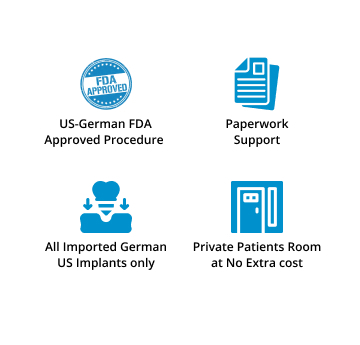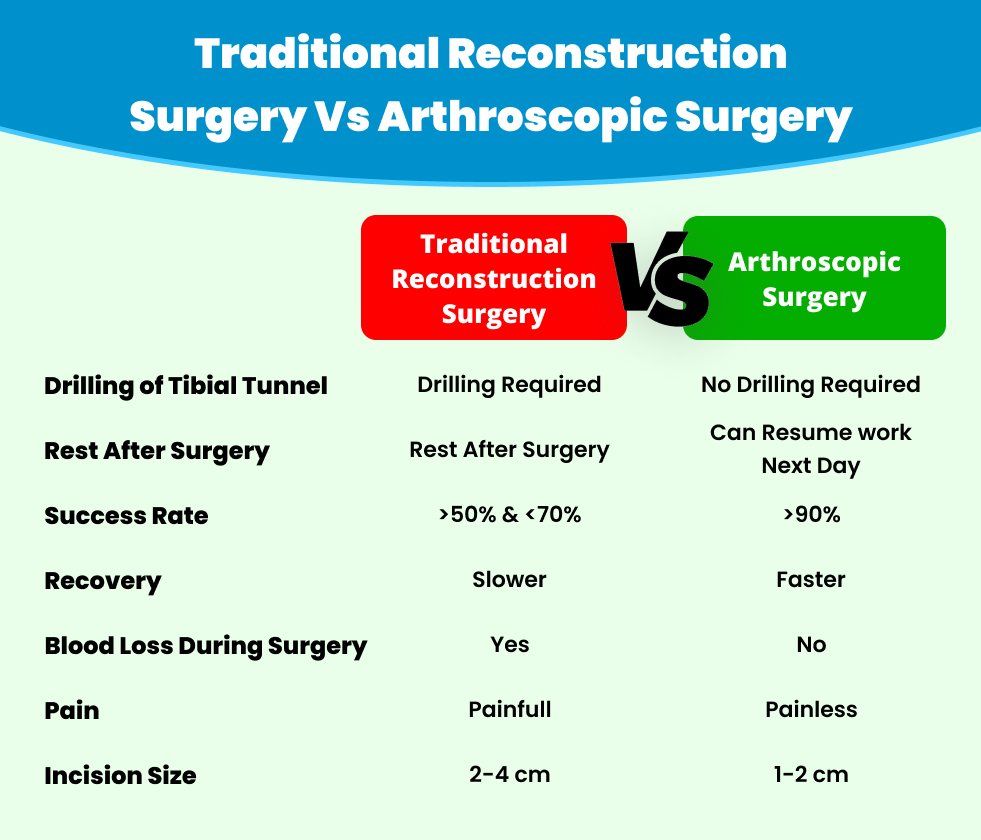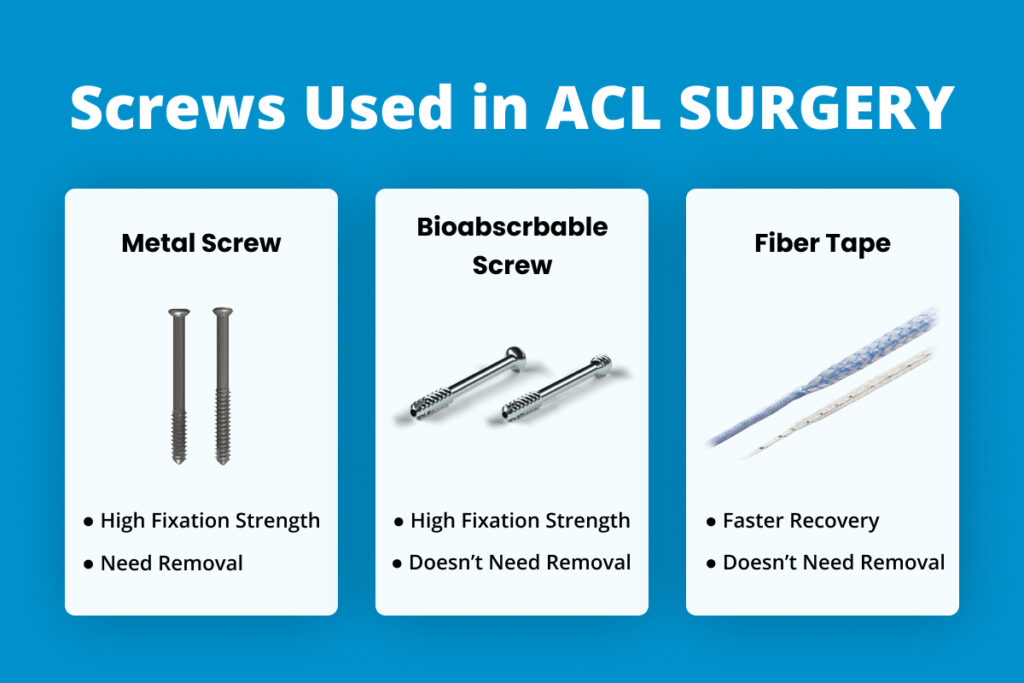Anterior Cruciate Ligament (ACL) Surgery Cost in India- Get Cost
Discover the Latest in Surgical Procedures and Recovery. Discover the Latest in Surgical Procedures and Recovery.
Discover the Latest in Surgical Procedures and Recovery. Discover the Latest in Surgical Procedures and Recovery.
$1,25,500
(approx.)
$1,25,500
(approx.)
$1,25,500
(approx.)
Happy Patient
Surgeries
Hospital
Doctors
Cities
Clinics
Happy Patient
Understanding the various factors that influence the cost of Anterior Cruciate Ligament (ACL) Surgery treatment can help you make an informed decision. Here are some key elements:
ACL surgery is a surgical procedure to repair or reconstruct the anterior cruciate ligament (ACL), a ligament in the knee that helps to keep the knee joint stable. The ACL is one of four ligaments that connect the femur (thighbone) to the tibia (shinbone). It is located in the center of the knee joint and helps to prevent the tibia from sliding forward on the femur.
ACL tears are common among athletes, especially those who participate in sports that involve sudden changes in direction or twisting movements, such as basketball, football, and skiing. ACL injuries can also occur in people who do not participate in sports, but they are less common.
Dr. Darsh Goyal is the Best ACL surgeon in Delhi with experience in ACL surgery. Choosing him for your ACL surgery in Delhi comes with several potential benefits. Still, it's important to weigh these against any potential drawbacks and compare him to other qualified surgeons based on your specific needs. Here are some factors to consider:
Reasons why some patients might choose Dr. Darsh Goyal for ACL Surgery in Delhi

Expertise and experience: Dr. Goyal has extensive experience treating knee injuries, including ACL tears. He holds an MBBS degree, an MS in Orthopaedics, and a Fellowship in Arthroscopy and Sports Injury, indicating specialized knowledge in minimally invasive techniques relevant to ACL surgery.
Successful track record: Dr. Goyal's website and online reviews showcase positive patient experiences and successful outcomes for ACL reconstructions. This evidence of his expertise can be reassuring for potential patients.
Focus on minimally invasive techniques: Dr. Goyal utilizes arthroscopic surgery for ACL reconstruction whenever possible. This approach typically leads to faster recovery times, less pain, and a lower risk of complications compared to open surgery.
Patient-centered approach: Some patients report Dr. Darsh Goyal as the “Best ACL Surgeon in Delhi”, is attentive, explains procedures clearly, and addresses concerns empathetically. This communication style can be valuable for building trust and managing anxiety before and after surgery.
Accessibility and convenience: Dr. Goyal practices at multiple locations in Delhi, making it easier for patients to find a convenient appointment.
The cost of ACL surgery in Delhi can vary depending on the individual's overall health, the extent of the surgery, and the presence of any complications. It is important to talk to your doctor about the specific costs of your surgery.
Autograft surgery - ₹1,40,000 to ₹2,00,000
Allograft surgery - ₹2,00,000 to ₹3,00,000
Autograft Synthetic graft surgery - ₹1,80,000 to ₹2,80,000

The type of anesthesia used: General anesthesia is typically used for ACL surgery, and this can add to the cost of the procedure.
The need for additional procedures: If you need any additional procedures, such as a meniscectomy, this will also add to the cost of your surgery.
Post-operative care: The cost of post-operative care, such as physical therapy, can also vary depending on your individual needs.
Insurance coverage: The type of insurance coverage and policy limits can significantly impact your out-of-pocket costs.

The type of ACL surgery that is best for a particular patient will depend on several factors, including the patient's age, activity level, and other medical conditions.
Autograft surgery is the most common type of ACL surgery. It is generally considered to be the strongest and most durable option. However, it is also the most invasive type of surgery, and it can cause some pain and discomfort at the donor site.
Allograft surgery is a good option for patients who do not want to have a tendon removed from their own body, or who are not good candidates for autograft surgery due to other medical conditions. Allograft surgery is less invasive than autograft surgery, but it is associated with a higher risk of re-injury.
Synthetic graft surgery is the least common type of ACL surgery. It is a good option for patients who are not good candidates for autograft or allograft surgery, such as patients with allergies or infections. However, synthetic grafts are not as strong or durable as autograft or allograft tendons, and they are associated with a higher risk of re-injury.
ACL (anterior cruciate ligament) surgery is a complex procedure performed to repair or reconstruct a torn ACL in the knee. Here is a general overview of the steps involved in ACL surgery:

Evaluation: The surgeon evaluates the patient's medical history, conducts a physical examination, and may order imaging tests like MRI to assess the extent of the ACL injury.
Anesthesia: The patient is administered either general anesthesia, which puts the patient to sleep during the surgery, or regional anesthesia, which numbs the lower part of the body.
Small incisions are made around the knee to insert an arthroscope (a thin, flexible tube with a camera) and surgical instruments.
The arthroscope allows the surgeon to visualize the inside of the knee on a monitor.
2. ACL Removal (if necessary): If the ACL is completely torn, the damaged ligament is removed.
3. Graft Harvesting (if using autograft): If ACL reconstruction is planned using the patient's own tissue (autograft), the surgeon makes an additional incision to harvest the graft (often from the patellar tendon, hamstring tendon, or quadriceps tendon).
4. Tunnels Creation: The surgeon drills small tunnels into the tibia (shinbone) and femur (thighbone) at the original ACL attachment points.
5. Graft Insertion and Fixation: The harvested graft or allograft is threaded through the tunnels and secured with screws, buttons, or other fixation devices. The graft is positioned to replicate the natural ACL's function.
6. Closure: The incisions are closed with sutures or surgical staples, and sterile dressings are applied.
ACL surgery can provide several benefits, including:
Improved knee stability
Reduced risk of further injury
Increased ability to participate in sports and other activities
Improved quality of life
ACL surgery is a safe and effective procedure, but there are some side effects associated with all surgery. These risks include:
Infection
Bleeding
Blood clots
Nerve damage
Pain
Swelling
Stiffness
Failure of the graft
In addition to the general risks of surgery, ACL surgery also has some specific side effects, such as:
Patellar tendonitis (inflammation of the patellar tendon)
Hamstring weakness
Graft rupture
Meniscus injury
Knee arthritis
ACL surgery recovery typically takes 6 to 8 months. During this time, patients will need to work with a physical therapist to regain strength and range of motion in the knee. They will also need to wear a brace and crutches for several weeks.
Most patients are able to return to normal activities within 6 to 8 months after surgery. However, it is important to note that recovery time varies from person to person. Some people may need more time to fully recover, while others may be able to return to activities sooner
Here is a general overview of the ACL surgery recovery timeline:
Weeks 1-3: The main focus during this time is on reducing pain and swelling. Patients will also begin to work on regaining range of motion in the knee.
Weeks 4-6: Patients will continue to work on regaining range of motion and strength in the knee. They may also be able to begin weight-bearing exercises.
Weeks 7-12: Patients will continue to work on strength and range of motion. They may also be able to begin light activities, such as walking and biking.
Months 4-6: Patients will continue to work on strength and range of motion. They may also be able to begin more rigorous activities, such as jogging and swimming.
Months 7-8: Patients should be able to return to all normal activities, including sports. However, it is important to continue to listen to your body and rest when you need to.
Follow your doctor's instructions carefully.
Attend all of your physical therapy appointments.
Be patient and don't rush your recovery.
Listen to your body and rest when you need to.
Eat a healthy diet and get enough sleep.
Avoid activities that could put stress on your knee, such as running and jumping, until you are cleared by your doctor.
| Service/Factor | Description | Estimated Cost (INR) |
|---|---|---|
| Initial Consultation | Consultation with an orthopedic specialist | ₹1,000 - ₹2,000 |
| Diagnostic Tests | MRI, X-rays, blood tests, etc. | ₹5,000 - ₹10,000 |
| Surgery Fees | Surgeon's fee for performing the ACL surgery. | ₹50,000 - ₹1,00,000 |
| Hospital Stay | Room charges for the duration of the hospital stay | ₹20,000 - ₹50,000 |
| Anesthesia Fees | Charges for anesthesia during surgery | ₹10,000 - ₹20,000 |
| Post-operative Care | Immediate post-surgery care and medications | ₹5,000 - ₹15,000 |
| Physiotherapy | Rehabilitation sessions post-surgery | ₹20,000 - ₹40,000 |
| Additional Services | Transportation, personalized care, etc. | ₹2,000 - ₹5,000 |
| Features | Nectar Plus | Other Providers |
|---|---|---|
| Free Follow-up Consultation |  Yes Yes |  No No |
| 24*7 Care Coordinator |  yes yes |  No No |
| No Cost EMI |  Yes Yes |  No No |
| Pickup & Drop Services |  yes yes |  No No |
| Hospital Duration |  Shorter Stay Shorter Stay |  Longer Stay Longer Stay |
| Minimum Paper Work |  yes yes |  No No |
| Insurance Coverage Assistance |  Yes Yes |  No No |
| Personalized Treatment Plans |  yes yes |  No No |
Is composed of bones and cartilage that form the face and the cranium, which surrounds the brain. You can feel the bones of the cranium on top of the skull. The 5 bones that form the bottom, or base, of the cranium also form the eye socket, roof of the nasal cavity,

Experienced, skilled, and dedicated to your health.

Employing Modern & Cutting-edge Medical Technologies.

100% transparency in Pricing & No-Cost EMI Options available.

Post-Operative Care for Faster Healing.
Is composed of bones and cartilage that form the face and the cranium, which surrounds the brain. You can feel the bones of the cranium on top of the skull. The 5 bones that form the bottom, or base, of the cranium also form the eye socket, roof of the nasal cavity,
Yes, ACL surgery is a major surgery. It is a complex procedure that requires general anesthesia and may involve several hours of surgery. However, it ...
Recovery from ACL surgery typically takes 6 to 8 months. During this time, patients will need to work with a physical therapist to regain strength and ...
The cost of ACL surgery can vary depending on a number of factors, including the type of surgery performed, the surgeon's fees, and the cost of anesth ...
Yes, you can walk after ACL surgery. However, you will likely need to use crutches or a walker for several weeks after surgery. You will also need to ...
ACL surgery is a safe and effective procedure. However, there are some risks associated with all surgery, such as infection, bleeding, and blood clots ...
Life after ACL surgery involves dedicated rehabilitation, including physical therapy and strength training, to regain knee stability and function. Adh ...
Is composed of bones and cartilage that form the face and the cranium, which surrounds the brain. You can feel the bones of the cranium on top of the skull. The 5 bones that form the bottom, or base, of the cranium also form the eye socket, roof of the nasal cavity,
Yes, ACL surgery is a major surgery. It is a complex procedure that requires general anesthesia and ...
Recovery from ACL surgery typically takes 6 to 8 months. During this time, patients will need to wor ...
The cost of ACL surgery can vary depending on a number of factors, including the type of surgery per ...
Yes, you can walk after ACL surgery. However, you will likely need to use crutches or a walker for s ...
ACL surgery is a safe and effective procedure. However, there are some risks associated with all sur ...
Life after ACL surgery involves dedicated rehabilitation, including physical therapy and strength tr ...